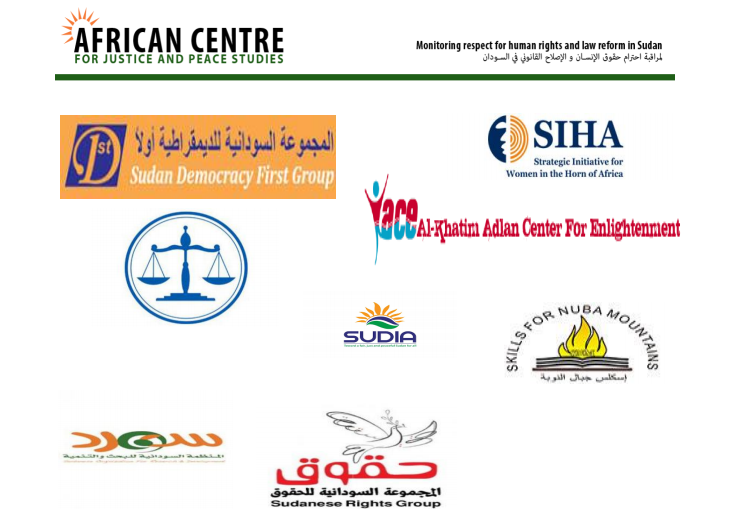Sudan’s unfolding transition offers both great promise and substantial risk, according to a new analysis. There is every reason to expect that entrenched interests that have benefited under the old regime will resist reform, but there is also every reason to expect that the forces of change will continue to press forward, the International Crisis Group reports.
While Sudan has embarked on a path toward democratic and accountable government, economic fragility threatens to derail its transition, it observes. The Friends of Sudan should bolster the civilian-led administration with urgently-needed financial support and call for an African Union envoy to help keep the transition on track.
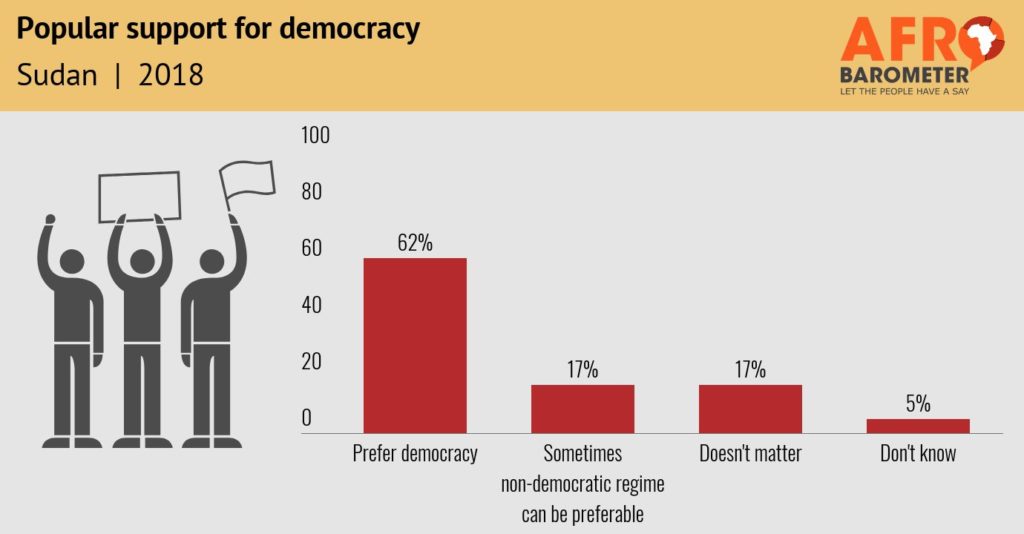 The transition promises to be anything but easy, a recent Afrobarometer report suggests. Economic problems that sparked initial protests in 2018 still await complex solutions, and the state bureaucracy remains weak. How will the military and the clergy, both important players in Sudanese politics of the past, interact with democratic aspirations for the future?
The transition promises to be anything but easy, a recent Afrobarometer report suggests. Economic problems that sparked initial protests in 2018 still await complex solutions, and the state bureaucracy remains weak. How will the military and the clergy, both important players in Sudanese politics of the past, interact with democratic aspirations for the future?
Sudan’s transition signals the possibility of a second Arab Spring, one observer suggests, noting that across the Arab world, an increasing number of citizens disagree with the “use of religion for political gain,” according to a recent YouGov survey:
Dr. Abdulkhaleq Abdulla, a former chairman of the Arab Council for Social Sciences, said that the YouGov findings suggest that the days of using religion for political gain are over. With unrest continuing in several Arab countries, including Iraq and Lebanon, Abdulla sees it as a second round of the so-called Arab Spring, this time gripping Algeria, Sudan, Lebanon and Iraq.
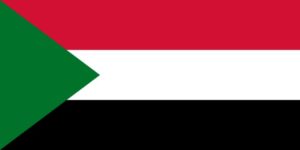 “What is clear is that this second round is much more peaceful, focused and has already delivered a great deal,” he said. “In Sudan, we have seen a very peaceful transition that was done to the satisfaction of the Sudanese people, and transition to democracy is going smoothly.”
“What is clear is that this second round is much more peaceful, focused and has already delivered a great deal,” he said. “In Sudan, we have seen a very peaceful transition that was done to the satisfaction of the Sudanese people, and transition to democracy is going smoothly.”
Sudanese Prime Minister Abdalla Hamdok became the first Sudanese leader to travel to Washington, DC in more than thirty years, seeking to win more international support for his transitional government as it tries to guide Sudan towards democracy, the Atlantic Council’s David A. Wemer reports.
“There is a success story that is emerging” in Sudan, Hamdok told an audience at the Atlantic Council on December 5 (above). In a “region full of crises and riddled with conflicts, Sudan provides hope,” he declared.
Seven months after the fall of Omar al-Bashir and his 30-year-long kleptocracy, Sudan is struggling to escape the legacy of corruption and mismanagement he bequeathed it, the Economist adds:
Nowhere is this more evident than in the traffic-clogged streets of Khartoum, the capital, where public transport has all but disappeared……Traffic jams are the work of the “deep state”, conjectures one observer. A group of minibus owners in north Khartoum claim that saboteurs are causing gridlock by abandoning vehicles in the roadways. Some blame members of the former ruling party, the National Congress Party, which owned nearly 40,000 vehicles.
 Civil society groups (below), including several partners of the National Endowment for Democracy, were closely involved in negotiating a peaceful transition.
Civil society groups (below), including several partners of the National Endowment for Democracy, were closely involved in negotiating a peaceful transition.
Hamdok took office on August 21 as part of a power-sharing deal between Sudan’s armed forces and the Forces of Freedom and Change (FFC)—a group representing pro-democracy protesters, the Atlantic Council’s Wemer adds. Waves of demonstrations in early 2019 against former president Omar al-Bashir, who had ruled the country through repression for thirty years, culminated in the president’s removal by the armed forces on April 11. The military initially intended to govern the country for a two-year period, but intense protests—and a violent massacre of more than one hundred demonstrators on June 3—forced the military leadership into the agreement with the FFC.
The United States has praised Hamdok’s efforts to reform Sudan’s political system and break with the practices of the previous regime, Brookings analyst Payce Madden reports. In an example of these efforts, on Thursday, December 5, Sudan’s Sovereign Council and Cabinet announced the disbanding of the National Congress Party (NCP), established by former President Bashir, and to cancel the Public Order Law, which enforced strict moral codes and disproportionately affected women.
But there are many potential ways that Sudan could fail to arrive at its scheduled democratic elections in 2022, analyst Rebecca Hamilton writes for Foreign Policy:
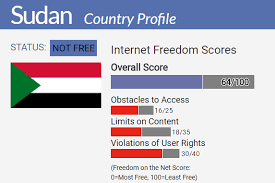 The first threat comes from the National Congress Party (NCP) and its supporters. The transitional government recently passed a law that dissolved the NCP, but this does not mean that members of the NCP will exit the political landscape. Former NCP members are prohibited from participating in the new Legislative Council, but they can still do much to undercut the reforms that the transitional government seeks to make. …
The first threat comes from the National Congress Party (NCP) and its supporters. The transitional government recently passed a law that dissolved the NCP, but this does not mean that members of the NCP will exit the political landscape. Former NCP members are prohibited from participating in the new Legislative Council, but they can still do much to undercut the reforms that the transitional government seeks to make. …- Another risk is that established political elites may call for early elections. Under the terms of the transitional arrangement no one in the cabinet or Sovereignty Council can run in the 2022 elections. This means that the established opposition parties, formed before and during Bashir’s reign, have little direct power during the transitional period. ….
- Complicating matters further, the army, RSF, and internal security forces all have competing loyalties, interests, and cultures, opening up the possibility of different parts of the security sector going into battle against each other. Notwithstanding the revolution, the entire security sector remains shrouded in secrecy, with off-the-books financial flows that make accountable governance impossible. …
- Next, there are the as-yet unresolved conflicts throughout the peripheral parts of the country. Reaching peace deals with armed groups from The Blue Nile to Darfur is essential, not only for stability, but also to enable the transitional government to realize the revolution’s goal of building an inclusive state. …
-
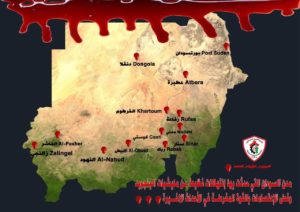
MEMRI
Finally, there is the ever-present risk that the people who made the revolution happen will withdraw their support for the transition if they see no meaningful improvements in their daily lives. This makes economic recovery the transitional government’s number one priority in a crowded list of urgent tasks. …RTWT
In order to offset these threats, the Friends of Sudan, comprising African powers, Western donors and long-time partners of Khartoum from the Gulf region, should commit to a course of action commensurate with the urgency of this once-in-a-generation chance to steer Sudan toward durable stability, the Crisis Group adds, recommending the following steps:
- As a matter of top priority, the Friends of Sudan should immediately coordinate available economic support for Sudan’s transition, working with the Sudan International Partners’ Forum on the ground in Khartoum to strategically identify and deliver projects that have near-term benefits for the people of Sudan. …..
- With an eye toward the period beginning in mid-2020 and leading up to 2022 elections, the Friends of Sudan should step up preparations to establish a multi-donor trust fund (MDTF) for Sudan to be managed by the World Bank. ….. Some governments may be reluctant to provide medium-term funding until the transition is further along, and risks have abated. This would be a mistake: the country’s needs are too great, and the transition too fragile for a wait-and-see approach. Simply put, withholding support greatly accentuates the risk that the civilian-led administration will fail. ….
 The Friends of Sudan should work together to press the U.S. – itself part of the group – to rescind its out-dated designation of Sudan as State Sponsor of Terrorism (SST). Beyond providing comfort to international investors eager to re-engage with Sudan and removing a major obstacle to debt relief on some $60 billion owed to creditors, rescission of the SST designation would provide a political boost to the transitional government and thereby strengthen Hamdok in relation to the security forces. …..
The Friends of Sudan should work together to press the U.S. – itself part of the group – to rescind its out-dated designation of Sudan as State Sponsor of Terrorism (SST). Beyond providing comfort to international investors eager to re-engage with Sudan and removing a major obstacle to debt relief on some $60 billion owed to creditors, rescission of the SST designation would provide a political boost to the transitional government and thereby strengthen Hamdok in relation to the security forces. …..- Relatedly, and to address concerns among external partners about entrenched corruption networks and the grip of military actors over the economy, members of the Friends of Sudan should help Sudan put its financial house in order and tackle graft. They should provide technical assistance to the government to help track state revenues and stymie illicit rent-seeking behaviour within Sudan’s complex state and parastatal machineries, including in the profitable and corruption-prone gold and oil sectors. …..
- As Crisis Group advocated in a recent report, the Friends of Sudan should encourage the African Union (AU) immediately to appoint a new special envoy for Sudan who would represent the region in supporting the implementation of the transitional agreement and the reform agenda and be based out of the AU’s liaison office in Khartoum. RTWT
